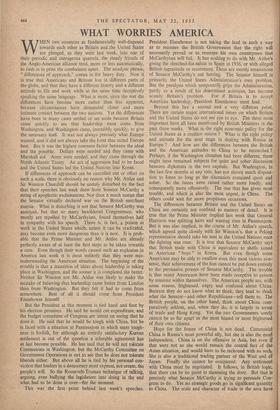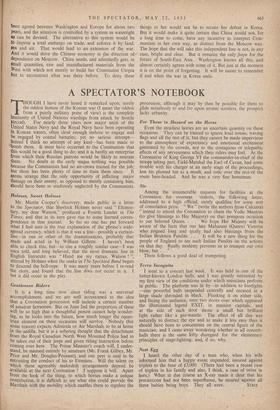WHAT WORRIES AMERICA
WHEN two countries as fundamentally well-disposed towards each other as Britain and.the United States are plunged, as they were last week, into one of their periodic and outrageous quarrels, the steady friends of the Anglo-American alliance tend, more or less automatically, to rush in to prise the combatants apart. The anodyne phrase, " differences of approach," comes in for heavy duty. Now it is true that Americans and Britons live in different parts of the globe, and that they have a different history and a different attitude to life and work while at the same time deceptively speaking the same language. What is more, since the war the differences have become more rather than less apparent, because circumstances have demanded closer and more intimate contact between the two nations. Yet the differences have been in many cases settled or set aside because Britain came quickly to see that leadership must come from Washington, and Washington came, incredibly quickly, to give the necessary lead. It was not always precisely what Europe wanted, and it did not always take the form that suited Europe best. But it was the highest common factor, between the ideal and the possible. Dollars were needed and they came with Marshall aid. Arms were needed, and they came through the North Atlantic Treaty. An act of aggression had to be faced and the United States led the United Nations into Korea.
If differences of approach can be cancelled out or offset on such a scale, there is obviously no reason why Mr. Attlee and Sir Winston Churchill should be unduly disturbed by the fact that their speeches last week drew from Senator• McCarthy a string of apoplectic exclamations. Nor does it much matter that the Senator virtually declared war on the British merchant marine. What is disturbing is not that Senator McCarthy was annoyed, but that so many bewildered Congressmen, who mostly are repelled by McCarthyism, found themselves half in sympathy with his speech. There is, in fact, a poison at work' in the United States which, unless it can be eradicated, may become even more dangerous than it is now. It is prob- able that the Prime Minister and Mr. Attlee are already perfectly aware of at least the first steps to be taken towards a cure. Even though their words caused such an explosion in America last week it is most unlikely that they were mis- understanding the American situation. The beginning of the trouble is that a transition of ideas about leadership is taking place in Washington, and the sooner it is completed the better. Neither Sir Winston nor Mr. Attlee was likely to make the mistake of believing that leadership came better from London than from Washington. But they felt it had to come from somewhere.' Best of all it should come from President Eisenhower himself.
But the President at this moment is tied hand and foot by his election promises. He said he would cut expenditure, and the budget committee of Congress are intent on seeing that he does it. He said that he would be tough with China, but he is faced with a situation at Panmunjom in which mere tough- ness is foolish, for although an entirely satisfactory Korean settlement is out of the question a tolerable agreement has at last become possible. He has said that he will not tolerate Communists in Washington, but the McCarthy Committee on Government Operations is out to see that he does not tolerate liberals either. But above all he is tied by his personal con- viction that leaders in a democracy must express, not create, the people's will. So the Roosevelt-Truman technique of talkirii, arguing, even bullying the legislature into doing in the end what had to be done is over—for the moment.
This was the first point behind last week's speeches. President Eisenhower is not taking the lead in such a way as to reassure the British Government that the right will necessarily prevail or to reassure his own countrymen that McCarthyism will fail. It has nothing to do with Mr. Attlee's giving the clenched-fist salute in Spain in 1936, or with alleged British ingratitude or resentment. These are merely emanations of Senator McCarthy's red herring. The Senator himself is primarily the United States Administration's own problem. But the paralysis which temporarily grips the Administration, partly as a 'result of his determined activities, has become acutely Britain's problem. For if Britain is to accept American leadership, President Eisenhower must lead.
Beyond this lies a second and a very different point. There are certain major international issues on which Britain and the United States do not see eye to eye. The three most important have all been mentioned by British Ministers in the past three weeks. What is the right economic policy for the United States as a creditor nation ? What is the right policy and attitude for the next stage in dealing with Russia in Europe ? And how are the differences between the British and the American attitudes to China to be reconciled ?, Perhaps, if the Washington situation had been different, these might have remained subjects for quiet and sober discussion between diplomats in the two capitals. Bit Washington, in the last few months at any rate, has not shown much disposi- tion to listen so long as the discussion remained quiet and sober. So the issues were raised rather more loudly, and consequently more offensively. The one that has given most trouble, and which is also the most urgent, is China. The others could wait for more propitious occasions.
The differences between Britain and the United States on China are certainly not confined to matters of detail. It is true that the Prime Minister implied last week that General Harrison was splitting hairs and wasting time in Panmunjom. But it was also implied, in the course of Mr. Attlee's speech, which agreed quite closely with Sir Winston's, that a Peking representative should take his seat in the United Nations once the fighting was over. It is true that Senator McCarthy says that British trade with China is equivalent to shells aimed at American " boys " in Korea. But even though some Americans may be able to swallow even this most vicious non- sense, their achievement of the feat cannot be put down entirely to the persuasive powers of Senator McCarthy. The trouble is that many Americans have been made receptive to poison by tensions within themselves. The American people are, with some reason, frightened, angry and confused about China. Because they do not know what to think, they tend to think what the Senator—and other Republicans—tell them to. The British people, on the other hand, think about China com- paratively seldom, and, when they do, it is largely in terms of trade and Hong Kong. Yet the two Governments surely cannot be so far apart as the most biased or most frightened of their own citizens.
Hope for the future of China is not dead. Communist China is Russia's most powerful ally, but she is also the most independent. China is on the offensive in Asia, but even that were not so she would remain the central fact .of the Asian situation, and would have to be reckoned with as such She is also a traditional trading partner of the West and of -Japan. Finally she cannot be conquered. Any settlement with China must be negotiated. It follows, in British logic, that there can be no point in slamming the door. But that is precisely what Senator McCarthy is trying to persuade Con- gress to do. Yet no strategic goods go in significant quantity to China. The scale and character of trade in the area have been agreed between Washington and Europe for about two years, and the situation is controlled by a system as watertight as can be devised. The alternative to this system would be to impose a total embargo on trade, and enforce it by land, tea and air. That would lead to an extension of the war. And it would drive the Chinese economy in the direction of- dependence on Moscow. China needs, and admittedly gets, in ;mall quantities, raw and manufactured materials from the West with which not merely to build her Communist Utopia but to reconstruct what was there before. To deny these things to her would not be to secure her defeat in Korea. But it would make it quite certain that China would not, for a long time to come, have any incentive to interpret Com- munism in her own way, as distinct from the Moscow way. The hope that she will take this independent line is not, in any - case, bright and clear. But it remains the only hope for the future of South-East Asia. Washington knows all this, and almost certainly agrees with some of it. But just at the moment it is on the point of forgetting. It will be easier to remember if and when the war in Korea ends.



































 Previous page
Previous page